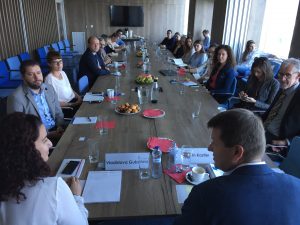Bavarian Politics Matter for Central Europe and Slovakia

GLOBSEC recently hosted a discussion with Martin Kastler, Resident Representative for Slovakia, Czech Republic and Hungary for the Hanns Seidel Foundation, who gave his take on the current state of Bavarian politics. Elections in Germany's largest federal state are just one month away (14 October) and there might be trouble ahead for the Christian Social Union (CSU), the party that has dominated Bavaria's political landscape for some time. These elections also matter for Slovakia, its near-neighbours and the whole of Europe.
From the outset, Mr Kastler emphasised that Bavaria is one of Europe's most competitive economic regions with a GDP (EUR 600 billion) comparable to that of Switzerland, and eclipsing Slovakia's by a wide margin (EUR 85 billion). There are, nevertheless, close trade relations between Bavaria and Slovakia, with the latter recognised as among the top 15 recipients of Bavarian exports. In 2017, trade between Slovakia and Bavaria reached EUR 6.3 billion, more than other German federal states. Predictably the main categories are the automotive and electronics industries.
Yet, while economic growth remains consistent, Bavarian politics is changing. The CSU has held the reins of power in Bavaria with relatively few interruptions since its formation after the Second World War. Indeed, for the most part it has been able to govern without the need of a coalition partner. Recent polls, however, suggest that support for the CSU has declined in all parts of Bavaria, including areas with no or small numbers of migrants. The main benefactor in the decline has been the anti-establishment and right-wing Alternative für Deutschland (AfD). Mr Kastler identified several reasons for the reversal in CSU fortunes, including the relocation of more than 2.5 million Germans to Bavaria for economic reasons. This mass internal migration has impacted upon the issues that have traditionally shaped Bavarian politics. Another significant challenge to the traditional way of Bavarian life is the region's transition into a hub for modern technologies. The inevitable popular backlash has hit the CSU hard, with many starting to question its long-term grip on power.
In an attempt to win back lost support the CSU has chosen to fight the election on migration and border control. This summer's heated dispute between Chancellor Angela Merkel (CDU) and Interior minister Horst Seehofer (CSU) on these issues sent shock waves across Europe. To some observers, their spat was more about regional political maneuvering than tackling a Europe-wide concern. Others have warned, however, that by prioritising both challenges ahead of other state concerns the CSU risks losing even more votes to the AfD. As a counter, Bavaria's dominant political party might find it useful to pay increased attention to ordinary Bavarian's concerns and aspirations for the future. These might include the desire for a Bavarian Space Programme or an e-mobility infrastructure. Crucially, the CSU should remain a pro-European party.
While next month's state elections might prove to be the worst in the CSU's history, polls also suggest that it will still receive the most votes. The best case scenario is that retains enough of the popular vote to keep its absolute majority. A more unpalatable alternative sees the CSU embarking on the painful process of forming a coalition government with one or two partners. The Free Voters Party (FW) and Free Democratic Party (FDP) are the most obvious candidates. Both scenarios reflect that an uncertain Bavarian landscape would be an unwelcome development for Germany, the EU and Central Europe. Not only is the federal state is an important economic region, it is also an influential voice in European politics. Case in point, the leader of the European People’s Party Manfred Weber, who is Bavarian, recently endorsed by Chancellor Merkel for EPP’s spitzenkandidaten.
Below are some images from Mr Kastler's visit to GLOBSEC HQ.


